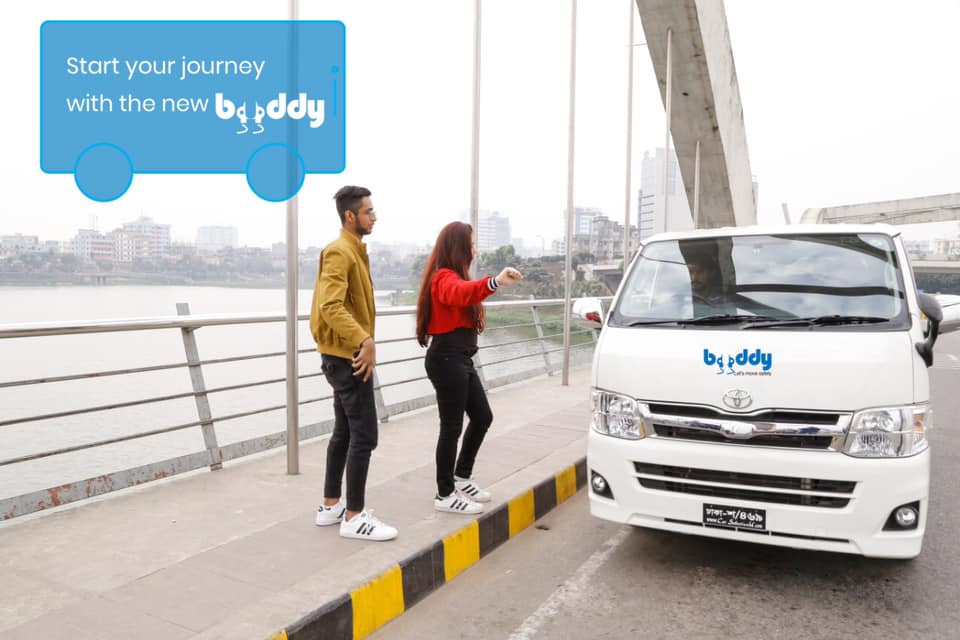
The ride-hailing market has peaked in Bangladesh and Buddy has managed to enter the market at the right time when we are seeing a slow start of a more serious discussion around the contribution of ride-hailing to the overall public transport system. It has been a hot topic in markets like the US and EU where companies like Uber are now taking initiative to accommodate public transport into their offering.
Given the reality of traffic conditions as well as the affordability of customers in Dhaka, carpooling is a much more appropriate service. However, encouraging user-led carpooling has been a challenge in many markets and without the participation of drivers, it will be a challenge for Buddy to scale. Buddy already has encountered the challenge on its first day.
It announced on its Facebook page: “We are overwhelmed by the huge response! Unfortunately, due to the ongoing car shortage, we are not being able to meet your current demands. We are working on it so that we can cover most of the routes as soon as possible.” How Buddy addresses this challenge going forward is going to be critical for the growth of the company.
It is going to be interesting to see how incumbent ride-hailing players like Pathao, Shohoz, and Obhai respond to this development in the market. Incorporating carpooling into their existing infrastructure should be a relatively straightforward thing and their already established market position should give them an extra advantage against Buddy.
While theoretically, it seems a pretty simple strategy, it would not be any easier for them to grow a carpooling service either. The main challenge to the growth of carpooling would be finding the right incentive for the drivers. When a driver can earn a good amount of money carrying a single passenger, why should he/she bother to carry more passengers to earn an equal amount of money?
In December, a somewhat similar service was launched in Dhaka called Shuttle, an app-based pick and drop service for women. Shuttle, which came out of Robi’s internal entrepreneurship development program r-venture, wanted to offer a safe, comfortable and affordable transportation solution for women. Now that Buddy launched, it would not be an overstatement to say that there is a market for more diverse transportation solutions in Dhaka.
The urban transportation spending is about 7 billion dollars in Bangladesh. In Dhaka, it is about 4.1 billion dollars(6). According to industry insiders, ride-hailing is about BDT 20bn market, which is about 5-6% of the entire transportation industry in Bangladesh. The sector is growing at a 14-16% rate annually(5). The race for urban mobility in Dhaka is just getting started.
From Intelligence Brief: The Ride-hailing Market Updates:
“Ride-hailing continues to be one of the most happening markets in Bangladesh. 2018 was a big year for the industry. Pathao raised a US$10 million in funding led by Go-Jek and participated by existing investors Openspace Ventures, Osiris Group and Battery Road Digital Holdings. Shohoz raised US$15 million led by Singapore-based Golden Gate Ventures and participated by Linear VC of China, 500 Startups and Singaporean-based angel investor Koh Boon Hwee. Uber has also increased its focus on bike sharing market while it continues to dominate the car market.”
There are reasons for that. Public transport is a challenge in Dhaka. This is a multifaceted problem inundated with insufficiency of public transport, infrastructure, and much more. With the launch of companies like Buddy and Shuttle, and bicycle-sharing startup Jobike we are entering a new phase of urban transportation experiment. However, it does not mean that we are anywhere near to finding the solution to Dhaka's transportation woe, let alone solving it. But we are well into urban mobility 2.0.
Cover photo credit: Buddy Facebook page
